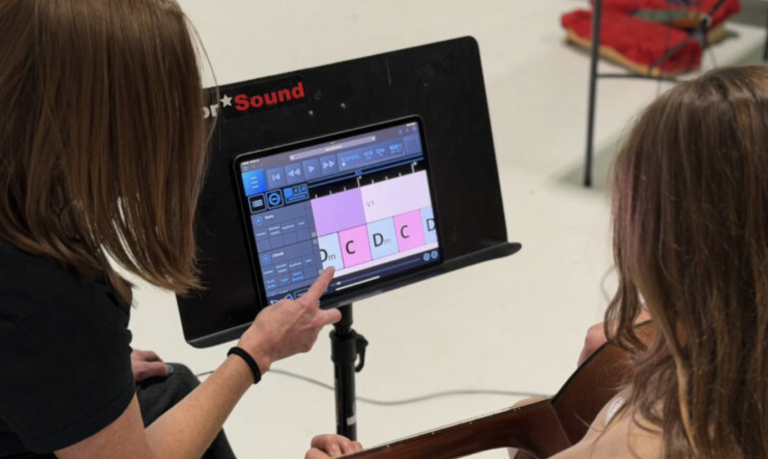
Christian music has always been a big part of many people’s lives, offering comfort, hope, and a way to connect with faith. It’s not just about old hymns anymore; christian music has grown and changed a lot over the years, reaching new audiences and finding new ways to express itself. This article looks at how christian music keeps making a difference in today’s world, from its deep roots to its modern forms.
Key Takeaways
- Classic hymns still matter a lot, helping people remember their faith and providing comfort through their familiar tunes.
- Gospel music has a huge impact on culture and money, shaping American music and creating a big industry.
- In our digital world, christian music is everywhere, easy to find and share, but it also faces some new challenges.
- Music is super important in Christian worship, balancing how people perform and how everyone can join in.
- Christian music is really diverse, with lots of different styles, showing off how rich and varied God’s creation is.
The Enduring Power of Traditional Hymns

Timeless Melodies and Lyrical Depth
There’s something about old hymns that just sticks with you. Maybe it’s the way the words are put together, or the simple, yet beautiful tunes. These songs have a way of speaking to the soul that modern music sometimes misses. It’s like they’re built to last, passing down through generations. I remember singing them in church as a kid, not really understanding the words, but feeling something special nonetheless. Now, looking back, I appreciate the depth of the lyrics and the way they teach important truths. Hymns are great for teaching doctrinal truths, especially those focusing on God’s love.
Hymns as Anchors in Memory and Faith
Hymns aren’t just songs; they’re like anchors in our memories. They remind us of specific times, people, and places. My grandma used to sing "Amazing Grace" every Sunday, and now whenever I hear it, I think of her. It’s a powerful connection to the past and to our faith. Plus, there’s something comforting about singing the same songs that Christians have sung for centuries. It creates a sense of unity and belonging. It’s like we’re all part of something bigger than ourselves.
The Uniqueness of Classic Hymnody
Classic hymns have a certain quality that sets them apart. It’s hard to put into words, but it’s there. Maybe it’s the way they combine poetry and music, or the way they express deep emotions in a simple way. Whatever it is, it’s something special. They offer a different experience than contemporary music. They are more than just catchy tunes; they are expressions of faith, hope, and love. They are a reminder of the rich history of Christian music and its enduring power.
Hymns are like old friends. They’ve been around for a long time, and they’re always there when you need them. They offer comfort, hope, and a connection to something bigger than yourself. In a world that’s constantly changing, hymns remain a constant reminder of the enduring power of faith.
Gospel Music’s Cultural and Economic Influence
Gospel music is more than just a genre; it’s a cultural cornerstone and a significant economic force. It’s interesting to see how it has shaped so much of American culture and continues to do so.
The Historical Roots of Gospel Music
Gospel music emerged from the African American church experience, blending spirituals, blues, and jazz. It was a way to express faith, hope, and resilience in the face of adversity. These songs provided solace and strength during times of slavery and segregation. The music evolved over time, incorporating new instruments and styles, but the core message of faith remained constant.
Gospel’s Impact on American Culture
Gospel music has had a huge impact on American culture. It influenced the Civil Rights Movement, with songs like "We Shall Overcome" becoming anthems of hope and change. Many artists, like Aretha Franklin and Sam Cooke, started in gospel before crossing over to mainstream success. Gospel’s influence can be heard in soul, R&B, and even rock and roll. It’s woven into the fabric of American music.
The Financial Significance of Gospel Music
Gospel music is also a big business. It generates millions of dollars each year through album sales, concerts, and merchandise. Artists like Kirk Franklin and Yolanda Adams have achieved commercial success and won numerous awards. Gospel music festivals and concerts attract thousands of fans, boosting local economies. It’s a thriving industry that continues to grow. Here’s a quick look at some of the revenue streams:
- Album Sales
- Concert Tickets
- Merchandise
- Licensing Deals
Gospel music’s economic impact extends beyond just the music industry. It supports jobs, generates revenue for local businesses, and contributes to the overall economy. It’s a testament to the enduring power and appeal of this genre.
Christian Music in the Digital Age
Accessibility and Global Reach
It’s kind of wild how much the internet has changed things, right? Christian music is no exception. Now, artists can share their songs with people all over the world without needing a record label’s permission. It’s like the ultimate DIY platform. You can find pretty much any style of Christian music you want with a quick search. It’s not just limited to what’s playing on the radio anymore. Streaming services have made gospel music more accessible than ever.
Innovation in Production and Collaboration
Digital tools have seriously changed how Christian music is made. Think about it: you can record an entire album on your laptop now. People are experimenting with new sounds and mixing genres in ways that weren’t possible before. Plus, artists can easily work together even if they live on opposite sides of the planet. It’s pretty cool to see how technology is helping people get creative.
New Possibilities and Challenges
Of course, with all these new opportunities come some challenges. It can be tough to stand out when there’s so much music out there. And making money as an artist is harder than ever because of streaming. But at the same time, the internet has created new ways for artists to connect with their fans and build communities. It’s a constantly changing landscape, but it’s definitely an exciting time for Christian music.
The digital age presents both incredible opportunities and significant hurdles for Christian musicians. While the ability to reach a global audience and experiment with new sounds is unprecedented, the challenges of discoverability and financial sustainability require artists to be innovative and adaptable. It’s a time of great potential, but also one that demands careful navigation.
The Role of Music in Christian Worship
Music as a Vital Component of Faith
Music has always been super important in Christian worship. Think about it – from the Old Testament stories of the Israelites singing after crossing the Red Sea, to the Psalms, music is everywhere. It’s not just background noise; it’s a way to connect with God. It helps us express our feelings, whether it’s joy, sorrow, or thankfulness. It’s like, when words aren’t enough, music steps in to fill the gap. I remember singing in the church choir as a kid, and even though I didn’t always understand the words, I felt something powerful. It’s more than just singing; it’s about participating in something bigger than yourself.
Balancing Performance and Participation
Okay, so here’s the thing: sometimes church music can feel more like a concert than worship. You’ve got the super talented musicians up front, and everyone else is just watching. But worship isn’t a spectator sport, right? It’s about everyone joining in. It’s a tricky balance. You want the music to be good, but you also want it to be accessible and inviting for everyone to participate. Maybe it’s about choosing songs that are easy to sing along to, or making sure there are opportunities for the congregation to contribute in other ways. I think congregational singing is important.
The Importance of Discernment in Worship Music
With so many different styles of music out there, it’s important to be thoughtful about what we include in worship. Not every song is created equal. Some songs might have catchy tunes but lack substance in their lyrics. Others might be theologically questionable. It’s about choosing music that honors God and helps us grow in our faith. It’s not about being stuck-up or judgmental, but about being intentional about what we’re singing and why. I think it’s important to have Christian rock and other styles, but we need to be careful about what we’re including.
Choosing music for worship is a big deal. It’s not just about what sounds good, but about what helps us connect with God and each other. It’s about finding that sweet spot where tradition and innovation meet, where everyone feels welcome and able to participate. It’s a constant process of learning and growing, but it’s worth it when you see the impact it has on people’s lives.
Here’s a quick look at some considerations:
- Theological Accuracy
- Congregational Accessibility
- Cultural Relevance
Diversity Within Christian Music
Christian music isn’t just one thing; it’s a huge mix of sounds and styles. It’s pretty cool how many different ways people express their faith through music. From old hymns to modern pop, there’s a lot to explore. It’s not just about sticking to what’s familiar, but also opening up to new sounds and voices.
Embracing a Variety of Musical Styles
Christian music has really broadened its horizons. You’ve got everything from traditional gospel to Christian rock, and even Christian hip-hop. This variety helps different people connect with the music in ways that feel personal and meaningful. It’s like there’s something for everyone, no matter what kind of music they usually listen to. The key is to find what speaks to you and helps you connect with your faith.
From Classical to Contemporary Expressions
Think about the difference between a grand, classical hymn and a catchy, contemporary Christian pop song. They both express faith, but in totally different ways. Classical music might bring a sense of reverence and history, while contemporary music can feel more relatable and current. It’s interesting how these different styles can appeal to different generations and backgrounds. It’s all about finding what resonates with you.
Celebrating the Richness of God’s Creation
Christian music’s diversity reflects the diversity of the world. It’s like a musical tapestry woven with different cultures, languages, and experiences. When we embrace this variety, we’re celebrating the creativity and beauty of God’s creation. It’s a reminder that faith can be expressed in countless ways, and that there’s room for everyone at the table. It’s also important to consider alternative Christian music and how it is evolving.
It’s important to remember that the goal of Christian music is to connect with God and with each other. Whether you prefer traditional hymns or modern worship songs, the most important thing is that the music helps you grow in your faith and feel closer to God.
The Impact of Christian Music on Society
Inspiring Hope and Uplifting Spirits
Christian music has this amazing ability to lift you up when you’re feeling down. It’s like a sonic hug, you know? The lyrics often talk about hope, love, and faith, which can be super encouraging when life gets tough. I remember when my grandma was sick, she would listen to Christian hymns all day, and it really seemed to bring her peace. It’s more than just music; it’s a source of comfort and strength for many.
Shaping Popular Music Genres
Christian music’s influence is all over the place, even if you don’t realize it. Think about it: gospel music has had a huge impact on soul, R&B, and even rock and roll. Artists like Elvis Presley were heavily influenced by gospel. It’s kind of cool to see how these different styles blend together and create something new. It’s like a musical melting pot, and Christian music is definitely one of the key ingredients. It’s interesting to see how gospel music’s influence has shaped the sound of American popular music.
Promoting Education and Youth Development
Christian music can also play a role in helping young people grow and learn. Many churches and organizations use music programs to teach kids about music, teamwork, and faith. These programs can give kids a sense of belonging and help them develop important skills. Plus, it’s a positive way for them to express themselves and connect with others. It’s not just about singing; it’s about building community and helping kids reach their full potential.
Christian music provides a positive outlet for young people, offering a sense of purpose and belonging. It encourages creativity, builds confidence, and instills values that can guide them throughout their lives. It’s a powerful tool for shaping the next generation.
Christian Music and Personal Connection

A Source of Comfort and Strength
Christian music often acts as a balm during tough times. It’s like a friend who knows exactly what to say when you’re feeling down. The lyrics can speak directly to your struggles, reminding you that you’re not alone and that there’s hope. I remember when my grandma passed away, I couldn’t stop listening to gospel songs. It was the only thing that brought me a little peace. It’s amazing how a simple melody can lift your spirits.
- Provides solace during grief.
- Offers reassurance in times of uncertainty.
- Reminds us of faith during challenges.
Christian music provides a unique way to connect with something bigger than yourself. It’s not just about the sound; it’s about the message and the feeling it evokes. It’s a reminder that even in the darkest moments, there’s always light to be found.
Fostering Community and Belonging
Music has this incredible power to bring people together. Think about concerts or even just singing in church. There’s a sense of unity that’s hard to find anywhere else. When you’re singing the same songs, sharing the same message, you feel like you’re part of something bigger. It’s like an instant connection with everyone around you. It’s a shared experience that strengthens bonds and creates a sense of belonging. The church has greater access to music and has shown greater openness to a greater variety of music.
- Creates a shared experience.
- Strengthens community bonds.
- Promotes a sense of unity.
Deepening Individual Faith Journeys
Christian music isn’t just something you listen to; it’s something you experience. It can deepen your understanding of faith and help you connect with God on a more personal level. The lyrics can be like prayers, guiding you through your thoughts and feelings. It’s a way to reflect on your beliefs and find new meaning in your faith. It’s like having a conversation with God through song.
- Encourages reflection on faith.
- Provides a means of personal prayer.
- Offers new perspectives on spiritual beliefs.
Conclusion: The Enduring Power of Christian Music in Today’s World
So, what’s the big takeaway here? Christian music, in all its forms, isn’t just some niche thing. It’s really stuck around, you know? From the old hymns that just get stuck in your head to the newer stuff that sounds like pop, it keeps finding ways to connect with people. It’s pretty cool how it helps folks feel less alone, gives them hope, and even gets them thinking about bigger things. It’s not going anywhere, that’s for sure. It just keeps changing and growing, showing up in new places and reaching new ears. And that’s a good thing, because sometimes, a song is exactly what you need.
Frequently Asked Questions
What exactly is Christian music?
Christian music is a broad term that covers many different styles, all of which share a common goal: to express Christian faith and beliefs. This includes everything from old hymns to modern pop and rock songs.
Why is Christian music important to people?
Christian music helps people connect with their faith, find comfort, and feel like part of a community. It’s often used in church services and can also be a personal source of peace and strength.
Has Christian music influenced other types of music?
Yes, very much so! Over the years, gospel music, a type of Christian music, has greatly influenced many popular music styles like R&B, soul, and rock and roll. You can hear its impact in the melodies and singing styles of many famous artists.
How has technology changed Christian music?
In today’s world, Christian music is easier to find than ever before thanks to the internet and streaming services. This means more people around the globe can listen to it, and artists can try new things with their music.
Are there different types of Christian music?
Christian music is incredibly diverse. It includes traditional hymns, gospel, contemporary worship, Christian rock, pop, and even hip-hop. There’s a style for almost everyone!
How does Christian music affect society?
Christian music often inspires people, gives them hope, and helps them feel uplifted. It can also bring people together and has even played a role in supporting educational programs and youth development.








